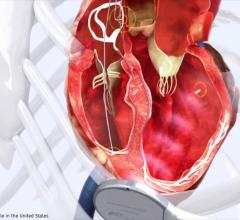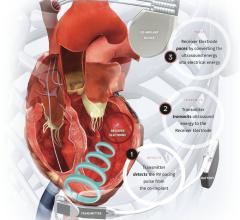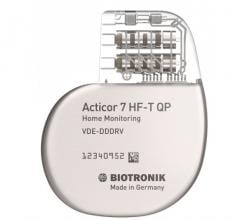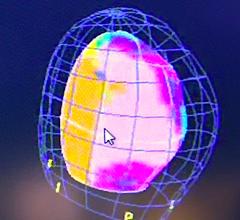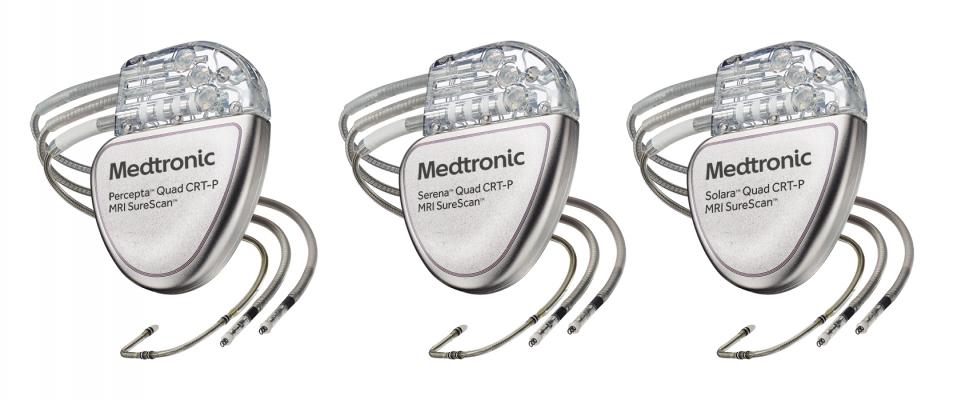
May 7, 2019 — The U.S. Food and Drug Administration (FDA) issued a safety communication to alert healthcare providers and patients about issues that may cause batteries in certain Medtronic implantable pacemakers or cardiac resynchronization therapy pacemakers (CRT-Ps) to drain more quickly than expected without warning.
Medtronic Pacemaker Battery Depletion Issue Identified
Medtronic has identified a rare but potentially serious failure mode in some of its Azure and Astra pacemakers, and Percepta, Serena and Solara cardiac resynchronization therapy pacemakers (CRT-P), manufactured with a specific multilayer ceramic capacitor. The company said these electrophysiology (EP) devices continue to perform within reliability projections.
Implanted pacemakers and CRT-Ps have electronics and are powered by lithium-ion batteries. One of the key electronic components is a capacitor, which stores electrical energy before discharge to pace the heart.
The company said a known failure mode of these capacitors is the potential for internal cracking, which can be caused by thermal-mechanical stress during manufacturing. Under rare conditions, internal cracking within a capacitor may result in the development of a power leakage pathway, causing high current drain and leading to rapid battery depletion. While the issue presents as rapid battery depletion, Medtronic said this is not a battery performance issue.
As of April 26, 2019, three battery depletion reports were filed out of about 266,700 devices distributed worldwide since February 2017. However, one of these events contributed to a patient death. Battery depletion due to this issue can range from several days to several weeks.
The FDA said in all three medical device reports it received, Medtronic reported that healthcare providers were unable to communicate with the device due to battery depletion, resulting in loss of pacemaker function. Medtronic also reported these events occurred within one year after the patient was implanted with the pacemaker or CRT-P, on average within seven months of getting the device implanted. The devices are designed to last between approximately 7.5 and 15 years or 6 and 10 years before requiring battery replacement, depending on the device and the amount of pacing.
One of the reported events resulted in the death of a pacemaker-dependent patient, the FDA said. In a second reported event, the patient experienced dizziness during follow-up and the provider was unable to communicate with the device, which resulted in the patient getting their device replaced. In the third reported event, there was no harm to the patient because the device was not implanted when the provider became aware that a connection with the device could not be established.
Medtronic said the three confirmed failures occurred within nine months post-implant. The projected rate for this issue is 0.0028 percent, with the most susceptible period for a leakage pathway to develop in the capacitor being the first 12 months post-implant.
Device Replacement is Not Recommended
Based on the low predicted rate of failure and the recent implementation of process and component enhancements, Medtronic expects few, if any, additional events to occur. The company said it consulted with its Independent Physician Quality Panel and does not recommend device replacement.
The FDA said prophylactic removal and replacement of affected devices is not recommended, but some patients who depend on pacing for survival may determine, in consultation with their physician, that device replacement is appropriate for their needs. The FDA said providers should consider whether elective device replacement is warranted due to pacemaker-dependent status or other high-risk features.
The FDA recommends replacing any pacemaker or CRT-P immediately if they receive an
Elective Replacement Indicator (ERI) CareAlert notification when the battery level drops below a certain limit. Currently, the FDA said there is not a factor, method or test to identify when devices with this form of premature battery depletion are approaching ERI, or to accurately predict remaining battery life once ERI appears. Once ERI is reached, an affected device is unlikely to have the standard three months of battery life remaining.
The FDA said providers should treat any ERI for pacemaker-dependent patients as a medical emergency.
Patients and Providers Should be Monitoring for Battery Status
Medtronic said physicians should continue normal patient follow-up in accordance with standard practice, and where possible, continue to utilize the low battery voltage wireless CareAlert (shipped ON), together with remote monitoring via CareLink home monitor or the MyCareLink Heart mobile app.
Per the instructions for use, at each follow-up, verify the status of the implanted system as well as the clinical effectiveness of the device. The company said clinicians should pay attention to any unexpected changes in remaining longevity estimates, or the inability to interrogate the device and/or transmit data.
The FDA said patients can use the remote monitoring systems, including Medtronic’s MyCareLink Monitor, to help their healthcare providers monitor battery status and general functioning of their implanted pacemaker or CRT-P. Providers receive CareAlert notifications through manual transmissions from the patient or wirelessly connecting to the patient’s implanted pacemaker or CRT-P when the patient’s device has CareAlerts programmed “ON.”
For Azure, Percepta, Serena and Solara, the FDA said these devices have wireless CareAlerts programmed by the healthcare provider. The monitor must remain powered on to ensure automatically scheduled transmissions are sent. CareAlerts should be programmed to “ON.”
For Astra, the FDA said these devices do not have wireless capability and require manual transmission by the patient. To ensure timely transmission of any CareAlerts done manually by the patient, the patient should have a transmission schedule and CareAlerts should be programmed “ON.”
Steps Taken for Newly-Manufactured Devices
This year, Medtronic received the FDA’s approval for a new step in the manufacturing process developed to better detect capacitor failures. A different type of capacitor is also being used to reduce the risk of rapid battery depletion in newly-manufactured devices.
Reporting Premature Battery Depletions
Medtronic Technical Services can be contacted with any questions at [email protected], or (800) 505-4636.
The company said confirmed premature battery depletions, regardless of cause, are reported in Medtronic's semi-annual product performance report under the confirmed “malfunctions” section for each device model. Product Performance information can be accessed directly at http://wwwp.medtronic.com/productperformance/
Specific Models Affected
Specific models this applies to are:
- W1DR01 Azure XT DR
- W1SR01 Azure XT SR
- W1TR01 Percepta CRTP MRI
- W1TR02 Serena CRTP MRI
- W1TR03 Solara CRTP MRI
- W1TR04 Percepta CRTP MRI
- W1TR05 Serena CRTP MRI
- W1TR06 Solara CRTP MRI
- W2DR01 Azure XT DR
- W2SR01 Azure XT SR
- W3DR01 Azure S DR
- W3SR01 Azure S SR
- W4TR01 Percepta Quad CRTP MRI SureScan
- W4TR02 Serena Quad CRTP MRI SureScan
- W4TR03 Solara Quad CRTP MRI SureScan
- W4TR04 Percepta Quad CRT-P MRI SureScan
- W4TR05 Serena Quad CRTP MRI SureScan
- W4TR06 Solara Quad CRTP MRI SureScan
- X2DR01 Astra XT DR MRI SureScan
- X2SR01 Astra XT SR MRI SureScan
- X3DR01 Astra S DR
- X3SR01 Astra S SR


 July 21, 2025
July 21, 2025 


